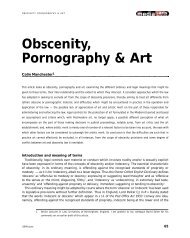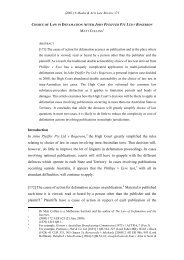Recent controversy over Phillip Gwynne's book Deadly, Unna? and ...
Recent controversy over Phillip Gwynne's book Deadly, Unna? and ...
Recent controversy over Phillip Gwynne's book Deadly, Unna? and ...
Create successful ePaper yourself
Turn your PDF publications into a flip-book with our unique Google optimized e-Paper software.
Gray, ‘Imagination, Fraud <strong>and</strong> the Cultural Protocols Debate’<br />
Title Act].’ 51 His Honour accepted that the connection between a native title right <strong>and</strong><br />
the l<strong>and</strong> <strong>and</strong> waters the subject of the right need not be physical, <strong>and</strong> that cultural<br />
knowledge in a traditional context is inextricably linked to the l<strong>and</strong>. While<br />
recognising that such a right would be ‘akin to a new species of intellectual property’,<br />
His Honour accepted ‘that the established laws of intellectual property are illequipped<br />
to provide full protection of the kind sought in this case’. 52 He noted further<br />
that the burden of proving that the recognition of such a right would fracture a<br />
‘skeletal principle’ of Australian law lay upon the party seeking to deny its existence.<br />
He considered that no evidence had been shown on the facts that this would occur.<br />
Finally, he noted the possible availability of ‘a constitutional argument for the<br />
protection of the right to cultural knowledge’ [34] based upon the prohibition on laws<br />
affecting the free exercise of religion in s 116 of the Constitution. 53<br />
If accepted by a future High Court, these views have the potential to transform the<br />
current approach of the judicial system towards indigenous intellectual property. This<br />
would be the case at least in a ‘traditional’ context where native title to l<strong>and</strong> could<br />
also be shown. It is unlikely, however, that even Kirby J would accept that native title<br />
to cultural knowledge could exist where native title to the l<strong>and</strong> or waters with which<br />
the cultural knowledge was connected had been extinguished. In any case, native title<br />
is unlikely to help indigenous people whose culture or lives have been portrayed in an<br />
insensitive or hurtful manner, unless the material so used can be characterised as<br />
‘traditional’. It is difficult to see, for example, how the shooting of Dumby Red could<br />
be regarded as traditional cultural knowledge of the kind recognised by Kirby J in<br />
Ward as an incident of native title.<br />
In any case, with the exception of Kirby J, the High Court in Ward was unable to<br />
recognise indigenous cultural expressions as a ‘nature or incident’ of native title. This<br />
was despite the statement in Mabo 54 itself <strong>and</strong> in s 223 of the Native Title Act 1993<br />
(Cth) that such incidents were to be determined with reference to indigenous law <strong>and</strong><br />
customs. This philosophical intransigence is reflected in the statements of authors <strong>and</strong><br />
filmmakers whose rights to freedom of expression is challenged after the event.<br />
51 Ibid 162 (Kirby J).<br />
52 Ibid 162–3 (Kirby J).<br />
53 Ibid 163 (Kirby J).



![ERIN O'DWYER [92] Introduction Striking a balance between ...](https://img.yumpu.com/14667367/1/184x260/erin-odwyer-92-introduction-striking-a-balance-between-.jpg?quality=85)


